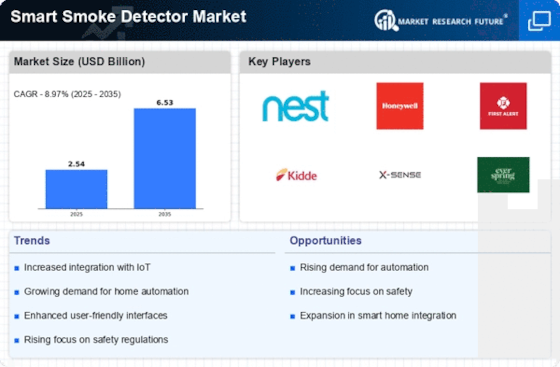Top Industry Leaders in the Smart Smoke Detector Market

The Competitive Landscape of Smart Smoke Detectors:
The smart smoke detector market is ablaze with innovation, fueled by a potent cocktail of rising safety concerns, technological advancements, and a growing tech-savvy consumer base. This dynamic landscape presents both opportunities and challenges for established players and aspiring entrants, demanding a keen understanding of the competitive forces at play.
Key Players:
- Nest Labs
- Samsung Electronics Co. Ltd
- Roost Inc.
- Huawei Technologies Co. Ltd
- BRK Brands Inc.
- Honeywell International Inc.
- AMP Security
- United Technologies Corporation
- Birdi
- Leeo Inc.
Strategies Adopted by Key Players:
- Expanding Product Portfolios: Offering a range of detectors catering to different price points and features, from basic models to premium options with video monitoring and remote control capabilities.
- Embracing Partnerships: Collaborating with smart home platform providers, security system companies, and even insurance providers to reach a wider audience and offer bundled services.
- Investing in R&D: Continuously developing new technologies like AI-powered smoke detection and integration with emergency response systems to stay ahead of the curve.
Market Share Analysis:
Analyzing market share in the smart smoke detector market requires a multifaceted approach, considering factors beyond just revenue or unit shipments. Here are some key considerations:
- Product Differentiation: Innovative features like multi-sensor technology, voice control, and integration with smart home ecosystems can significantly impact market share. Companies like Nest Labs and Ring have carved a niche with their user-friendly and interconnected smoke detectors.
- Distribution Channels: Reaching the target audience through the right channels is crucial. Traditional home improvement stores and online retailers like Amazon dominate, but partnerships with insurance companies or security service providers can provide an edge.
- Brand Reputation: Trust and reliability are paramount in a safety-critical market. Established players like Honeywell and Bosch Security Systems have a head start, while new entrants must build brand recognition through strategic marketing and quality assurance.
- Regional Variations: Market dynamics differ across regions. In North America, demand for advanced features is high, while price sensitivity is a major factor in developing markets like India. Companies need to tailor their offerings to regional preferences.
New and emerging companies:
- Targeting Niche Markets: Focusing on specific demographics like renters, seniors, or those with disabilities with tailored solutions, such as portable detectors or ones with voice prompts.
- Leveraging Technology: Utilizing advanced sensors, data analytics, and connectivity to offer additional features like air quality monitoring and carbon monoxide detection, expanding their value proposition.
- Prioritizing Affordability: Catering to budget-conscious consumers with basic yet reliable smart smoke detectors, making safety accessible to a broader market segment.
Industry Developments
Nest Labs:
- Latest update: In October 2023, Nest announced integration with Matter, a new smart home communication standard aimed at improving compatibility across devices.
- Other developments: Nest Protect, their flagship smoke detector, received software updates in 2022 for improved false alarm reduction and smoke chamber testing.
- Challenges: Nest Labs, now owned by Google, faces competition from established players like Honeywell and Bosch, as well as emerging startups.
Samsung Electronics:
- Latest update: In September 2023, Samsung showcased its SmartThings Station at IFA, a hub that can connect and control various smart home devices, including smoke detectors.
- Other developments: Samsung offers the SmartThings Smoke & Carbon Monoxide Detector, compatible with their SmartThings ecosystem.
- Challenges: Samsung needs to increase brand awareness and market share for its smart home products, particularly outside of its core appliance market.










